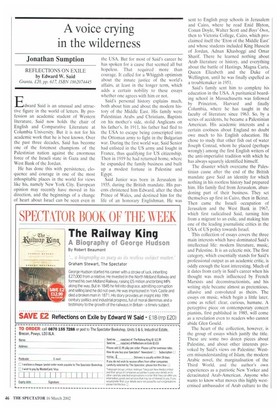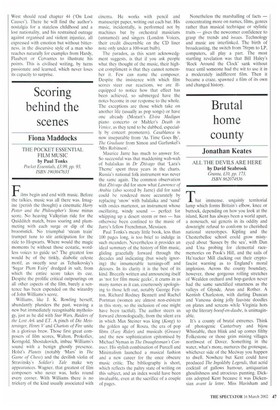A voice crying in the wilderness
Jonathan Sumption
REFLECTIONS ON EXILE by Edward W. Said
Granta, £20, pp. 617, ISBN 1862074445
Edward Said is an unusual and attractive figure in the world of letters. By profession an academic student of Western literature, Said now holds the chair of English and Comparative Literature at Columbia University. But it is not for his academic work that he is best known. Over the past three decades, Said has become one of the foremost champions of the Palestinian nation against the enormous force of the Israeli state in Gaza and the West Bank of the Jordan.
He has done this with persistence, eloquence and courage in one of the most inhospitable places in the world for views like his, namely New York City. European opinion may recently have moved in his direction, and the beginnings of a change of heart about Israel can be seen even in the USA. But for most of Said's career he has spoken for a cause that seemed all but hopeless. That required more than courage. It called for a Whiggish optimism about the innate justice of the world's affairs, at least in the longer term, which adds a certain nobility to these essays whether one agrees with him or not.
Said's personal history explains much, both about him and about the modern history of the Middle East. His family were Palestinian Arabs and Christians, Baptists on his mother's side, stolid Anglicans on his father's. In 1911, his father had fled to the USA to escape being conscripted into the Ottoman army to fight in the Bulgarian war. During the first world war, Said Senior had enlisted in the US army and fought in France, thus qualifying for US citizenship. Then in 1919 he had returned home, where he expanded the family business and built up a modest fortune in Palestine and Egypt.
Said Junior was born in Jerusalem in 1935, during the British mandate. His parents christened him Edward, after the then Prince of Wales, and destined him for the life of an honorary Englishman. He was
sent to English prep schools in Jerusalem and Cairo, where he read Enid Blyton, Conan Doyle, Walter Scott and Boys' Own, then to Victoria College, Cairo, which proclaimed itself the 'Eton of the Middle East' and whose students included King Hussein of Jordan, Adnan Khashoggi and Omar Sharif. There he learned nothing about Arab literature or history, and everything about the battle of Hastings, Magna Carta, Queen Elizabeth and the Duke of Wellington, until he was finally expelled as a troublemaker in 1951.
Said's family sent him to complete his education in the USA. A puritanical boarding school in Massachusetts was followed by Princeton, Harvard and finally Columbia, where he has taught in the faculty of literature since 1963. So, by a series of accidents, he became a Palestinian American. His academic interests and a certain coolness about England no doubt owe much to his English education. He chose to study that other fish out of water Joseph Conrad, whom he placed (perhaps wrongly) among the first English writers of the anti-imperialist tradition with which he has always squarely identified himself.
The disaster which overcame the Palestinian cause after the end of the British mandate gave Said an identity for which nothing in his rootless history had prepared him. His family fled from Jerusalem, abandoning part of their business. They set themselves up first in Cairo, then in Beirut. Then came the Israeli occupation of Jerusalem and the West Bank in 1967, which first radicalised Said, turning him from a migrant to an exile, and making him one of the leading journalistic critics in the USA of US policy towards Israel.
This collection of essays covers the three main interests which have dominated Said's intellectual life: modern literature, music, and Palestine. It is an eclectic mix. The first category, which essentially stands for Said's professional output as an academic critic, is oddly enough the least interesting. Much of it dates from early in Said's career when his thought was much influenced by French Marxists and deconstructionists, and his writing style became almost as pretentious, allusive and convoluted as theirs. The essays on music, which begin a little later, come as relief: clear, curious, humane. A perceptive piece on contemporary concert pianists, first published in 1985, will come as a revelation even to readers who cannot abide Glen Gould.
The heart of the collection, however, is the group of essays which justify the title. These are some two dozen pieces about Palestine, and about other interests provoked by Said's views on Palestine: Western misunderstanding of Islam, the modern Arabic novel, the marginalisation of the Third World, and the author's own experiences as a patriotic New Yorker and deracinated Arab-American. Anyone who wants to know what moves this highly westernised ambassador of Arab culture to the
West should read chapter 44 (On Lost Causes'). There he will find the author's nostalgia for a stateless childhood and a lost nationality, and his restrained outrage against organised and violent injustice, all expressed with emotion but without bitterness, in the discursive style of a man who reaches naturally for examples from Hardy, Flaubert or Cervantes to illustrate his points. This is civilised writing, by turns passionate and learned, which never loses its capacity to surprise.

















































































 Previous page
Previous page